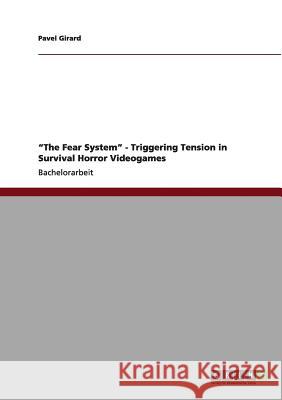The Fear System - Triggering Tension in Survival Horror Videogames » książka
The Fear System - Triggering Tension in Survival Horror Videogames
ISBN-13: 9783640992249 / Niemiecki / Miękka / 2011 / 56 str.
Bachelorarbeit aus dem Jahr 2011 im Fachbereich Anglistik - Sonstiges, Universitat Osnabruck, Sprache: Deutsch, Abstract: In this paper, it is sought to find out in which ways so-called "survival horror" videogames manage to elicit tension in the player. This will be done from a cultural/media studies perspective. In the course of this analysis, it will be argued that not only tension itself, but also several other emotions proclaimed as "negative" and provoked by playing a certain game can bring about tension, such as unsettlement, stress or disgust. It is assumed that these emotions evoke a basically negative mood in players so that they are more susceptible to be scared. This assumption draws on the film studies-related "Excitation Transfer Theory" developed by Dolf Zillmann in 1988, which Lee and Peng felt free to adopt on games (327-45). They state that "residual excitement from previous game playing may serve to intensify a later emotional state of a game player" (328). By arguing that feeling unsettled or experiencing frustration or disgust are in fact forms of excitement, Zillmann's theory can be related to the former argument. In the main part (chapter 4), a glance will be taken at the "videoludic staging of fear" (Roux-Girard 145) of two different survival horror game series: Resident Evil" (Capcom, 1996-99) and Silent Hill (Konami, 1999-2003). These specific series have been chosen, because, according to Picard (96), they are commonly said to be the most popular and the most representative ones within their genre. The series will first be analyzed individually in seperate chapters (though frequently referenced to each other), and will later be compared as a whole in the final conclusion. In the end, it is hoped that the following questions will have been answered: 1. What techniques are used by game developers to trigger tension in the player? 2. How do these techniques differ? 3. Which of the techniques are the most effective ones?











